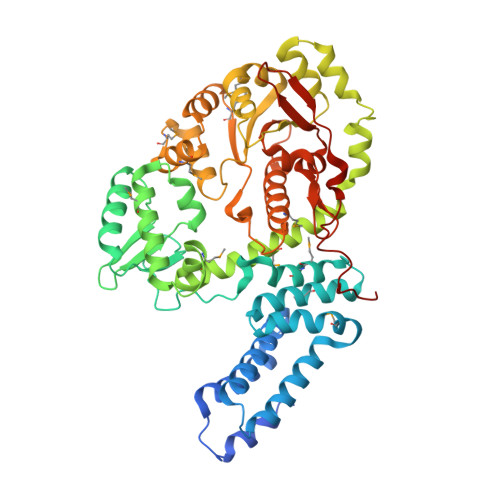The bacterial Ras/Rap1 site-specific endopeptidase RRSP cleaves Ras through an atypical mechanism to disrupt Ras-ERK signaling.
Biancucci, M., Minasov, G., Banerjee, A., Herrera, A., Woida, P.J., Kieffer, M.B., Bindu, L., Abreu-Blanco, M., Anderson, W.F., Gaponenko, V., Stephen, A.G., Holderfield, M., Satchell, K.J.F.(2018) Sci Signal 11
- PubMed: 30279169
- DOI: https://doi.org/10.1126/scisignal.aat8335
- Primary Citation of Related Structures:
5W6L - PubMed Abstract:
The Ras-extracellular signal-regulated kinase pathway is critical for controlling cell proliferation, and its aberrant activation drives the growth of various cancers. Because many pathogens produce toxins that inhibit Ras activity, efforts to develop effective Ras inhibitors to treat cancer could be informed by studies of Ras inhibition by pathogens. Vibrio vulnificus causes fatal infections in a manner that depends on multifunctional autoprocessing repeats-in-toxin, a toxin that releases bacterial effector domains into host cells. One such domain is the Ras/Rap1-specific endopeptidase (RRSP), which site-specifically cleaves the Switch I domain of the small GTPases Ras and Rap1. We solved the crystal structure of RRSP and found that its backbone shares a structural fold with the EreA/ChaN-like superfamily of enzymes. Unlike other proteases in this family, RRSP is not a metalloprotease. Through nuclear magnetic resonance analysis and nucleotide exchange assays, we determined that the processing of KRAS by RRSP did not release any fragments or cause KRAS to dissociate from its bound nucleotide but instead only locally affected its structure. However, this structural alteration of KRAS was sufficient to disable guanine nucleotide exchange factor-mediated nucleotide exchange and prevent KRAS from binding to RAF. Thus, RRSP is a bacterial effector that represents a previously unrecognized class of protease that disconnects Ras from its signaling network while inducing limited structural disturbance in its target.
- Department of Microbiology-Immunology, Feinberg School of Medicine, Northwestern University, Chicago, IL 60611, USA.
Organizational Affiliation:




















